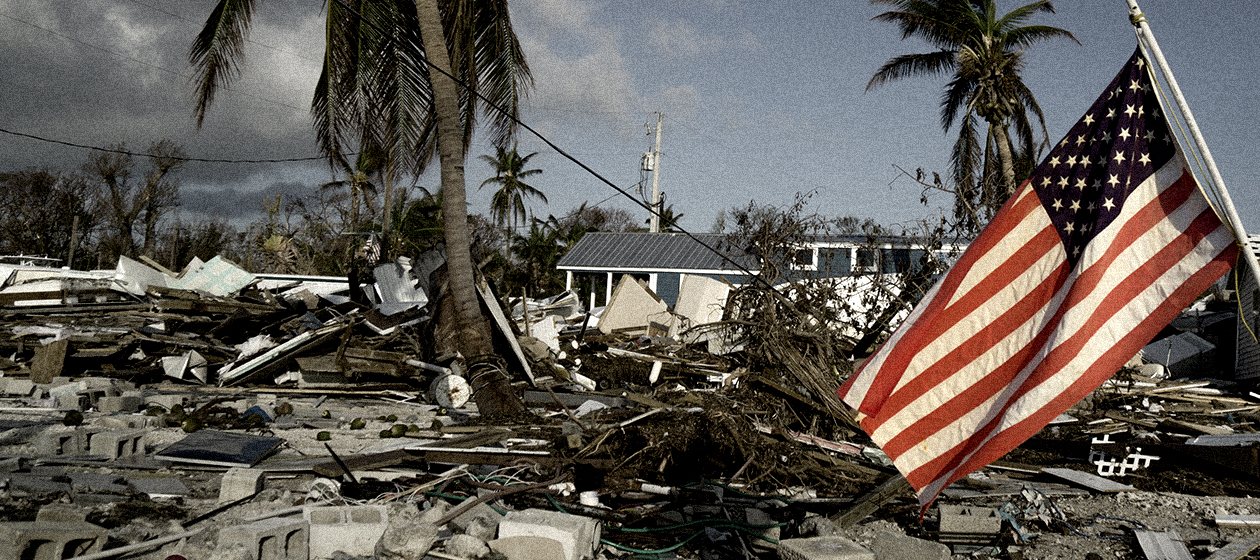How Americans came to their senses about climate change
Hurricanes and heat are changing hearts and minds


A free daily email with the biggest news stories of the day – and the best features from TheWeek.com
You are now subscribed
Your newsletter sign-up was successful
For a long time climate change felt far off to many Americans. Though people saw the pictures of melting ice caps and heard the warnings from Al Gore and 97 percent of climate scientists, they never truly felt this long-term environmental trend would threaten their own lives. Maybe it would affect future generations or people in the global south, where climate change will have especially deleterious effects, but not their own communities, not them.
So not only did countless Americans treat global warming like some minor threat that wouldn't hurt them in any major way, but many simply denied that it was even happening. This attitude was promoted by fossil fuel companies and special interests that funded propaganda questioning the scientific consensus, as well as the politicians who supported their views. Thus over the past few decades, the Republican Party — the party that once founded the Environmental Protection Agency — became the party of climate change denialism.
In recent years, however, this refusal to face reality has become increasingly hard to sustain, especially as extreme weather events become more and more common and menace more and more Americans. The latest instance of extreme weather, Tropical Storm Florence, is wreaking havoc on the Carolinas, and as many have already pointed out, there is strong evidence to suggest that climate change made it worse, increasing rainfall by up to 50 percent and slowing down the storm's movement. Florence arrives a little over a year after Hurricane Harvey, which devastated the Houston area, and Hurricane Maria, which went down as the worst natural disaster in Puerto Rico's recorded history.
The Week
Escape your echo chamber. Get the facts behind the news, plus analysis from multiple perspectives.

Sign up for The Week's Free Newsletters
From our morning news briefing to a weekly Good News Newsletter, get the best of The Week delivered directly to your inbox.
From our morning news briefing to a weekly Good News Newsletter, get the best of The Week delivered directly to your inbox.
There is little doubt in the scientific community about the effect that global warming is already having on the weather, and it is clearly making natural disasters more catastrophic than they were previously. Of course, it's not just hurricanes that are growing more deadly. The recent global heat wave that scorched America and left dozens of people dead was also connected to climate change, as were the wildfires that consumed the West Coast this summer.
Climate change is no longer some remote threat that can be dealt with by our great-grandchildren. It is here. Thankfully, more people seem to be waking up to reality.
A Pew Research Center survey from May, for example, found that six in 10 Americans now say that "climate change is currently affecting their local community either a great deal or some." Another recent survey conducted by the University of Michigan and Muhlenberg College found that 73 percent of Americans now believe in global warming — a record high for the survey, which has been taken since 2008 (admittedly, it's still depressingly low). The director of the Muhlenberg College Institute of Public Opinion, Chris Borick, told The Guardian that "there's lots of evidence that contemporary weather is a contributing factor to belief in climate change."
These are all positive developments, but the topic of climate change remains highly politicized in America, even as superstorms reach people from all political persuasions. "As is the case on many climate change questions, perceptions of whether and how much climate change is affecting local communities are closely tied with political party affiliation," writes Pew research associate Brian Kennedy. "About three-quarters of Democrats (76 percent) say climate change is affecting their local community at least some, while roughly a third of Republicans say this (35 percent)."
A free daily email with the biggest news stories of the day – and the best features from TheWeek.com
At the same time, while more people are beginning to acknowledge climate change and the danger it poses, the discussion has shifted for the "skeptics" from whether it is actually a threat (or even real) to whether it is a big enough threat to make the necessary sacrifices to confront it. "The talking points have turned more to the cost to mitigate climate change rather than deny its existence," observed Borick. This is clear with President Trump, who no longer calls climate change a "Chinese hoax," but instead argues that the policies designed to protect the environment are bad for the economy.
Calamitous megastorms aren't good for the economy either, of course, and in the long run global warming will have extremely negative economic consequences. President Trump and Republicans in Congress seem to only care about short-term profits, however, and have made it clear that they're unwilling to tackle climate change, even as more Americans come to realize its existential threat.
Florence is now devastating the Carolinas, and as my colleague Ryan Cooper pointed out on Thursday, Republican lawmakers in both North and South Carolina are notorious for their climate denialism and have done little to prepare for the impact that a changing climate will have on their states. One can only hope that the very real storms we are witnessing today will convince Americans across the political spectrum that we must address the clear and present danger of climate change before it's too late.
Conor Lynch is a freelance journalist living in New York City. He has written for The New Republic, Salon, and Alternet.
-
 How the FCC’s ‘equal time’ rule works
How the FCC’s ‘equal time’ rule worksIn the Spotlight The law is at the heart of the Colbert-CBS conflict
-
 What is the endgame in the DHS shutdown?
What is the endgame in the DHS shutdown?Today’s Big Question Democrats want to rein in ICE’s immigration crackdown
-
 ‘Poor time management isn’t just an inconvenience’
‘Poor time management isn’t just an inconvenience’Instant Opinion Opinion, comment and editorials of the day
-
 The billionaires’ wealth tax: a catastrophe for California?
The billionaires’ wealth tax: a catastrophe for California?Talking Point Peter Thiel and Larry Page preparing to change state residency
-
 Bari Weiss’ ‘60 Minutes’ scandal is about more than one report
Bari Weiss’ ‘60 Minutes’ scandal is about more than one reportIN THE SPOTLIGHT By blocking an approved segment on a controversial prison holding US deportees in El Salvador, the editor-in-chief of CBS News has become the main story
-
 Has Zohran Mamdani shown the Democrats how to win again?
Has Zohran Mamdani shown the Democrats how to win again?Today’s Big Question New York City mayoral election touted as victory for left-wing populists but moderate centrist wins elsewhere present more complex path for Democratic Party
-
 Millions turn out for anti-Trump ‘No Kings’ rallies
Millions turn out for anti-Trump ‘No Kings’ ralliesSpeed Read An estimated 7 million people participated, 2 million more than at the first ‘No Kings’ protest in June
-
 Ghislaine Maxwell: angling for a Trump pardon
Ghislaine Maxwell: angling for a Trump pardonTalking Point Convicted sex trafficker's testimony could shed new light on president's links to Jeffrey Epstein
-
 The last words and final moments of 40 presidents
The last words and final moments of 40 presidentsThe Explainer Some are eloquent quotes worthy of the holders of the highest office in the nation, and others... aren't
-
 The JFK files: the truth at last?
The JFK files: the truth at last?In The Spotlight More than 64,000 previously classified documents relating the 1963 assassination of John F. Kennedy have been released by the Trump administration
-
 'Seriously, not literally': how should the world take Donald Trump?
'Seriously, not literally': how should the world take Donald Trump?Today's big question White House rhetoric and reality look likely to become increasingly blurred
